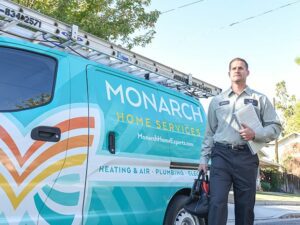If your air conditioner is over 15 years old, it likely uses R-22, a hydrochlorofluorocarbon (HCFC) refrigerant mistakenly referred to as Freon — one of several companies that make this HCFC coolant. While it was once a popular choice for cooling systems, it’s now in the phase-out process due to its environmental impact.
Thankfully, several eco-friendly alternatives offer enhanced energy efficiency and less harm to the environment. Learn about the latest HCFC-free, Freon alternatives for ACs and explore your options for upgrading your system to these environmentally friendly HVAC refrigerant replacements.

What is Happening to Freon (R-22)?
Since the 1920s, air conditioners were charged with refrigerants made with chlorofluorocarbons (CFCs), then later HCFCs. These coolants, made by many manufacturers such as Freon, Honeywell Gentron, DuPont, and Forane, were considered efficient at the time. However, later discoveries revealed they depleted the ozone layer. CFCs, sold under the names R-11, R-12, and R-115, and HCFCs, like R-22, were also linked to climate change, raising further concerns about the environmental impacts.
In 2010, the U.S. Environmental Protection Agency began its phase-out of Freon’s HCFC refrigerants in HVAC systems by halting production. While they didn’t ban it entirely for existing air conditioners, no further HCFC production means resources have become increasingly scarce and costly.
Top Freon Alternatives for Home AC Units
With the phase-out of R-22 by all manufacturers, the HVAC industry is transitioning to newer, more environmentally friendly alternatives. These modern refrigerants offer enhanced safety, efficiency, and minimal ozone depletion potential. Here’s a look at the most common alternatives and their benefits.
R-410A: The standard replacement
If you’ve replaced your AC unit in the last 20 years, there’s a good chance it runs on R-410A. This Honeywell Industries refrigerant blends difluoromethane and pentafluoroethane, chemicals known for their non-ozone-depleting properties and enhanced cooling efficiency.
You might recognize R-410A from its trademark names, including Suva 410A, Puron, AZ-20, Genetron R410A, Forane 410A, and EcoFluor R410. While it was the industry standard replacement, discoveries revealed its high Global Warming Potential. Its phase-out began at the beginning of 2023, with manufacturers moving towards more eco-friendly options.
If you have a unit that runs on R-410A refrigerant, there’s no need to panic. While new units no longer use this refrigerant, air conditioners can run without a refrigerant change for many years, so you won’t have to worry about making the switch anytime soon.
R-32: A more eco-friendly option
R-32, manufactured by Daikin, is becoming an increasingly popular alternative to R-22. When comparing R-32 vs. R-410A, it has a significantly lower Global Warming Potential, making it a more eco-friendly and sustainable choice. It’s one of the top air-conditioning refrigerant options for homeowners looking to reduce their carbon footprint. Unlike other refrigerant blends, R-32 is made with a single component, making it easier to recycle. It also offers faster heat transfer, improving overall efficiency and offering more effective cooling.
R-454B: The next-generation refrigerant
R-454B is produced by Chemours Company — the owner of the Freon trademark. It’s one of the newest R-22 alternatives, with a much lower Global Warming Potential than both R-410A and R-32. As one of the most eco-friendly options on the market, it’s ideal for those looking to reduce their environmental impact without sacrificing performance.
On top of its sustainability, R-454B is highly efficient, non-toxic, and has a low flammability rating. Most systems are already compatible, making it an easy transition to this new generation of refrigerant.
Natural refrigerants: CO2 and propane-based options
Natural refrigerants, like CO2 and propane, are some of the most eco-friendly alternatives to Freon. With a Global Warming Potential much lower than R-410A and R-32, they offer minimal environmental impact while still providing efficient heating and cooling.
CO2 is often found in commercial HVAC systems due to its energy efficiency and low environmental footprint. It’s non-toxic and non-flammable, making it a safer option, but operates at a higher pressure, meaning it’s only compatible with systems designed to handle it.
Propane, also called R-290, is a common eco-friendly alternative for smaller residential AC units and heat pumps. It’s efficient, has a low GWP, and is easy to recycle. One downside is that it’s highly flammable, making proper installation and maintenance crucial.
Should You Replace Your AC Unit or Retrofit It?
When upgrading your refrigerant, you’re left with the decision to replace or retrofit your unit. The right choice depends on your current system’s condition, your budget, and your long-term energy goals.
If your system is over 10 years old, inefficient, or becoming increasingly expensive to repair, replacement is likely the best option. Upgrading to a new, high-efficiency unit reduces your environmental impact and provides long-term savings on utility bills. Modern units are designed to work with more eco-friendly refrigerants, like R-32 and R-45B, both of which are energy efficient and have a lower Global Warming Potential than Freon.
If your air conditioner is in good condition, retrofitting is a cost-effective alternative to replacement. An HVAC technician will replace certain components, like the compressor or expansion valve, to make the unit compatible with a newer refrigerant. While less of an investment than replacement, retrofitting doesn’t offer the same efficiency upgrades and may limit the refrigerants you can use.
Environmental and Energy Efficiency Benefits of New Refrigerants
Switching to modern refrigerants like R-32, R-45B, CO2, and propane helps reduce your environmental impact while improving energy efficiency. These new refrigerants offer benefits including:
- Reduced global warming potential: Modern refrigerants have a significantly lower GWP, minimizing their impact on climate change.
- Improved energy efficiency: New refrigerants help HVAC systems run more efficiently, helping to lower your energy usage and utility bills.
- Minimal ozone depletion: Unlike HCFCs, newer alternatives have a minimal impact on the ozone layer, reducing their environmental impact.

Schedule Your AC Refrigerant Consultation Today!
An air conditioner using R-22 is likely to be 10 to 15 years old, and retrofitting may no longer be cost-effective. At Monarch, we can help you save over time with a high-quality AC replacement using the latest equipment. Our licensed, NATE-certified contractors will calculate load capacity, perform an airflow analysis, and help with ductwork design and necessary electrical upgrades. A new, energy-efficient system cools your home while reducing your environmental impact.
Contact us today to learn more about refrigerant upgrades or to schedule an AC replacement. With over 25 years of serving Central California with top-quality HVAC services, you can trust us to get the job done right.



